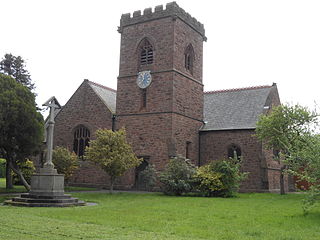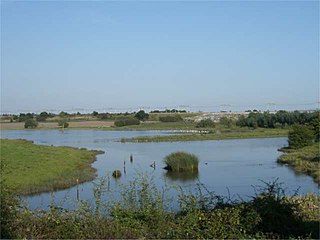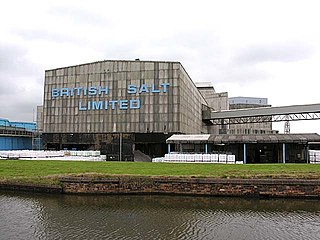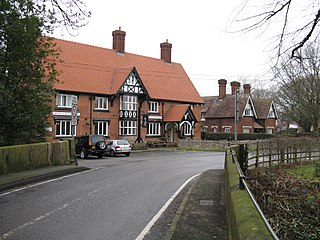
Nantwich is a market town and civil parish in the unitary authority of Cheshire East in Cheshire, England. It has among the highest concentrations of listed buildings in England, with notably good examples of Tudor and Georgian architecture. It had a population of 14,045 in 2021.

Northwich is a market and port town and civil parish in the unitary authority of Cheshire West and Chester in the ceremonial county of Cheshire, England. It lies in the heart of the Cheshire Plain, at the confluence of the rivers Weaver and Dane. The town is about 18 miles (29 km) east of Chester, 15 miles (24 km) south of Warrington, and 19 miles (31 km) south of Manchester.

Salt, also referred to as table salt or by its chemical formula NaCl, is an ionic compound made of sodium and chloride ions. All life depends on its chemical properties to survive. It has been used by humans for thousands of years, from food preservation to seasoning. Salt's ability to preserve food was a founding contributor to the development of civilization. It helped eliminate dependence on seasonal availability of food, and made it possible to transport food over large distances. However, salt was often difficult to obtain, so it was a highly valued trade item, and was considered a form of currency by many societies, including Rome. According to Pliny the Elder, Roman soldiers were paid in salt, from which the word salary is derived, although this is disputed by historians. Many salt roads, such as the Via Salaria in Italy, had been established by the Bronze Age.

Winsford is a town and civil parish in the unitary authority of Cheshire West and Chester and the ceremonial county of Cheshire, England, on the River Weaver south of Northwich and west of Middlewich. It grew around the salt mining industry after the river was canalised in the 18th century, allowing freight to be conveyed northwards to the Port of Runcorn on the River Mersey. The town of Winsford has an estimated population of 35,500 in 2024.

Sandbach Flashes are a group of 14 wetlands west of Sandbach in Cheshire, England. The flashes were designated as a Site of Special Scientific Interest in 1963, with a total area of 1.53 km2. There are a number of individual flashes including Bottom's Flash, Crabmill Flash, Elton Hall Flash, Fodens Flash, Groby's Flash, Ilse Pool, Moston Flashes, Pump House Flash, Railway Flash, Red Lane Tip and Pool, and Watch Lane Flash.
Middlewich, a town in northwest England, lies on the confluence of three rivers – the Dane, the Croco and the Wheelock. Most importantly for the history of salt making, it also lies on the site of a prehistoric brine spring.

Moulton is a civil parish and village in Cheshire, England, 3 miles (4.8 km) south of Northwich and 3 miles (4.8 km) north of Winsford.

Bad Dürrenberg is a spa town in the Saalekreis district, in Saxony-Anhalt, Germany. It is situated on the river Saale, approx. 8 km southeast of Merseburg. It is known for its historic graduation tower, the largest one in Germany.
The geology of Cheshire in England consists mainly of Triassic sandstones and mudstones. To the north west of Cheshire, these rocks are heavily faulted and the underlying Carboniferous Coal Measures are thrown up. Around the areas of Poynton and Macclesfield, the coal is close to the surface and was easily mined. Below the Coal Measures is the Millstone Grit, which appears towards the Derbyshire border on the flanks of the Peak District dome.

The Lion Salt Works is the last remaining open pan salt works in Marston, near Northwich, Cheshire, England. It closed as a works in 1986 and is now preserved as a museum.

Cheshire is a county in North West England. Rock salt was laid down in this region some 220 million years ago, during the Triassic period. Seawater moved inland from an open sea, creating a chain of shallow salt marshes across what is today the Cheshire Basin. As the marshes evaporated, deep deposits of rock salt were formed.

Open-pan salt making is a method of salt production wherein salt is extracted from brine using open pans.

British Salt Limited is a United Kingdom-based chemical company that produces pure white salt. The company is owned by Tata Chemicals Europe after a buy out from private equity company LDC in April 2010. It is based in Middlewich, Cheshire, employs 125 people, and produces approximately 800,000 tonnes of pure white salt every year.

St Peter's Church is a chapel to the west of Tabley House near Knutsford, Cheshire, England. It is recorded in the National Heritage List for England as a designated Grade I listed building.

Warmingham is a village and civil parish in the unitary authority of Cheshire East and ceremonial county of Cheshire, England, on the River Wheelock, 3.25 miles (5.23 km) north of Crewe, 3.25 miles (5.23 km) south of Middlewich and 3.25 miles (5.23 km) miles west of Sandbach. The parish also includes the small settlement of Lane Ends, with a total population of just under 250. Nearby villages include Minshull Vernon, Moston and Wimboldsley.
The history of Northwich can be traced back to the Roman period. The area around Northwich has been exploited for its salt pans since this time. The town has been severely affected by salt mining with subsidence historically being a large issue. A programme of mine stabilisation has recently been undertaken.

The New Cheshire Salt Works Ltd was a salt manufacturer formerly located in Wincham, north east of Northwich in Cheshire, UK. Run by the Stubbs family until its acquisition by British Salt, it operated between around 1923 and 2006. The company itself continues to exist as a subsidiary of British Salt. It produced white or brine salt from naturally occurring underground brine using natural or wild pumping. The salt was extracted by vacuum evaporation and was of a high quality. It was used for human consumption under the brandname "Selva" and in the pharmaceutical industry; New Cheshire was the only British company to supply salt for pharmaceutical use.

Sir Joseph Verdin, 1st Baronet, was a British salt industrialist, philanthropist and the Justice of the Peace, Deputy Lieutenant and County Alderman for the County of Cheshire. He was elevated to the Baronetage on 24 July 1896 and knighted in 1897. He later became Justice of the Peace for Herefordshire and High Sheriff in 1903.

A flash is a body of water that forms where the land below it has subsided. Whilst these are mostly found in areas where mining has taken place, some can occur naturally.
















